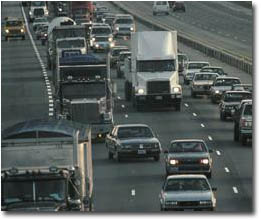Freeways and the Environment
The Society’s position has always been that it is impossible to build our way out of traffic congestion. One look at the nightmare that is Los Angeles will attest to that. How many lanes are there now – 14 in either direction – and they still have congestion.
Money on freeways would be better spent on an improved integrated public transport system, more light rail and designated bicycle lanes to encourage safer bike riding.

There are a number of fairly simple reasons why building more freeways will never relieve traffic congestion, or reduce pollution, or reduce fuel usage, or stimulate the economy as much as vested interest organisations like the RACV claim it will.
· There is no place in the City of Birmingham in England that is less than 8km from a freeway and, as Oliver Ticknell pointed out in his article Driven by Dogma, “If access by road is the key to economic prosperity, then Birmingham should be the wealthiest city in the U.K. It is not.”
· The M58 and the M62, examined by Whitelegg(1993) for the claims of economic benefits stated,” There is simply no evidence of the claimed link between access and employment or economic prosperity. The emperor has no clothes.”

· In a major study by Aschauer and Campbell in 1991, the economic benefits generated by building highways were shown to be less than half that of the benefits generated by public transport spending.
· The rationale that building more freeways reduces fuel use, travelling time and emissions came out of the General Motors laboratories in the 60s. And why wouldn’t it? Unbiased research shows that the opposite is the real truth. Even the EES statement for the Scoresby Freeway confirms an 18% increase in emissions, 13% increase in fuel use and a whopping 30% increase in vehicle kilometres travelled. No wonder the RACV supports freeway building – more business. If the RACV wanted to represent the concerns of its members it would be supporting public transport. More people on public transport, less road congestion, less traffic jams, less stressful driving conditions for its members. Makes sense, so why is it continually advocating for more road building?
· The reason for all these extra emissions, fuel use and kilometres travelled is something called “induced traffic”. Increasing travel speeds by building freeways increases the amount of travelling that people are prepared to do. Based on detailed studies by Newman and Kenworthy (1999) there was a 30% increase in travel as congestion was relieved. The claims that road building reduces emissions, fuel, or travel time is a myth. The claims are unsubstantiated.
Improving urban environments leads to a better economy, not building more freeways. We should be learning from the mistakes of others, not following blindly down the same road. Keith Loveridge

